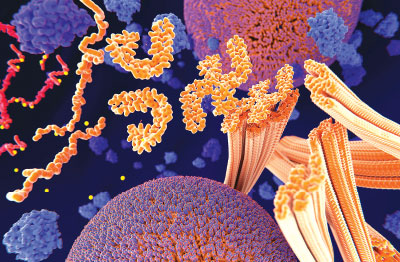Sleep Loss Found to Exacerbate Spread of Toxic Protein Associated With Alzheimer’s Disease
Abstract
Researchers hypothesize that consistently getting a good night’s sleep may help clear tau tangles in the brain.
Researchers have long known that the sleep-wake cycle regulates the accumulation of beta-amyloid—an early sign of Alzheimer’s disease—in the brain. A study published February 22 in Science shows that the same is true of the tau protein, which is believed to be the driver behind memory loss and cognitive decline in Alzheimer’s patients.

Jerrah Holth, Ph.D., of the Washington University School of Medicine in St. Louis, and her team made this discovery by looking at sleep and wakefulness patterns in mice and humans. Their research began with a look at the sleep habits of mice, which are nocturnal animals. Measuring the level of tau in their brain fluid during periods of wakefulness and sleep, the researchers found that the amount of tau increased twofold when the animals were awake.
“Given that tau levels were higher when the animals were awake, we were interested in whether acute sleep deprivation would result in an even greater rise in tau levels,” Holth told Psychiatric News. “To test that idea, we kept the mice awake over a three-hour period and then measured their tau levels. We found that they in fact doubled again, showing the impact of sleep deprivation.”
With this information in hand, the team wondered whether sleep deprivation led to increased tau levels in humans as well. They suspected that it would, especially since earlier research had shown that amyloid levels in cerebrospinal fluid (CSF) of humans, who ranged in age from 30 to 60 years old, were higher following one night of sleep deprivation. Using the CSF samples from that research, the team found that tau levels increased by 50 percent—an even higher jump than the 30 percent increase they had seen in amyloid levels. Both of these experiments, however, focused on sleep deprivation over short periods of time.
The logical next question was whether sleep deprivation over a longer period would produce similar results. To find out, the researchers produced human tau fibrils and injected them into the hippocampus of young mice. After depriving the mice of sleep for 28 days, they found that chronic sleep deprivation resulted in the spread of tau to other regions of the brain.
“Our key takeaway from the study is that the sleep-wake cycle regulates tau and that sleep deprivation increases tau levels and its ability to spread throughout the brain,” Holth said.
Implications for Human Health
The Washington University study adds to the growing body of evidence pointing to the importance of getting a good night’s sleep—adults require about 7.5 hours a night. The reason is that important physiological processes occur during sleep, especially during cycles of deep sleep and dreaming.
“We knew from earlier research that periods of deep-wave sleep can clear the amyloid, but now we have more direct evidence that sleep can also clear the tau tangles within the neuron,” said Rudolph Tanzi, Ph.D., director of the Genetics and Aging Research Unit at Massachusetts General Hospital. “Why this is important is that the tangles are actually destroying the neuron from within, which explains why the number of tangles correlates with the degree of dementia in Alzheimer’s.”
For older adults who may have trouble sleeping, Tanzi recommends 30 minutes of exercise a day to help them feel tired by bedtime. He also points out that people think that their sleep has to be uninterrupted and continuous, but that is not the case. “If you only get five or six hours at night, you can make up the difference by taking a couple of short naps during the day,” he noted. Other tricks include keeping the bedroom cool and dark and ensuring that no electronics are in the room.
Relaxing the brain before sleep by watching a boring television show also may help make it easier to fall asleep.
“It has been difficult to develop drugs that can reduce tangles,” said Tanzi. “If we can do that by getting enough sleep, that’s an important message to convey. At this point, it’s the best we can offer as a strategy for maintaining brain health.”
The study was supported by funding from the National Institutes of Health, Deutsche Forschungsgemeinschaft, the JPB Foundation, the Tau Consortium, the McDonnell Center for Systems Neuroscience at Washington University School of Medicine, and a grant from the BrightFocus Foundation.
“The Sleep-Wake Cycle Regulates Brain Interstitial Fluid Tau in Mice and CSF Tau in Humans” can be accessed here.



